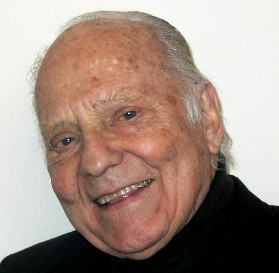
University of Southern California religion and gerontology professor emeritus Gerald A. Larue. Image provided by David Knight Larue
The Los Angeles Times noted yesterday evening that University of Southern California religion and gerontology professor emeritus Gerald A. Larue (b. June 20, 1916, d. September 17, 2014) has died at age 98. He was a long-time supporter of the Committee for Skeptical Inquiry and the Council for Secular Humanism, heading the latter’s Committee for the Scientific Examination of Religion from its founding in 1983 until handing over the reins to R. Joseph Hoffmann in 2003. Larue was also on the editorial board of Skeptic magazine from its founding in 1992 to its most recent issue.
Larue was the author of numerous books and articles on biblical history and archaeology, criticism of religion, and death and dying. He had been an ordained minister in the United Church of Canada, leading congregations from 1945 to 1953. In 1958 he joined the USC faculty as a professor of biblical history and archaeology, and joined the gerontology faculty in 1981, retiring in 2006. From 1980 to 1988, he was the first president of the Hemlock Society, a position he was asked to take after being the only other person at the organizing meeting besides founder Derek Humphry to be willing to join an organization that explicitly argued for the right to assisted suicide.
In June 1993, Larue went public with the exposure of the Noah’s Ark hoax of George Jammal, which was the centerpiece of CBS’s “The Incredible Discovery of Noah’s Ark” which aired on February 20 of that year. When Larue exposed the hoax in the pages of Time magazine, Sun International Pictures, the production company which made the film, argued that it was Larue who was engaged in a secular humanist plot to discredit Jammal. Sun issued a press release which complained that it was “sad and unfortunate that Dr. Larue, a distinguished USC professor, would victimize Mr. Jammal and his family to execute a third-party hoax in which he was the primary benefactor.” John Morris of the Institute for Creation Research pointed out that he had interviewed Jammal back in 1986, and that it was unreasonable to believe a hoax would have been carried out for that long.
But Larue, of course, was correct. Jammal had hoaxed Sun International Pictures and the Institute for Creation Research, and they had either missed or been unwilling to accept the numerous clues which he had planted in the content of his claims, such as the names of the individuals who had helped him on his alleged quest for Noah’s Ark: “Mr. Asholian,” “Vladimir Sobitchsky,” and, best of all, “Allis Buls Hitian.”
Jammal’s sample of wood from the Ark was actually a piece of railroad tie he had found behind his house and made to appear old by cooking it in his kitchen with a mixture of blueberry and almond wine, iodine, sweet-and-sour barbecue sauce, and teriyaki sauce. As Larue pointed out, carbon dating the wood would have given the game away, but none of the creationists or show producers bothered to do so. The producers also ignored the criticisms of Jammal’s account given by Bill Crouse, a regular critic of Noah’s Ark claims.
I had two interactions with Prof. Larue–once was a lengthy telephone conversation regarding the Jammal hoax in 1993, during which he was very generous with his time to answer my questions and provide the details of his involvement for my article on the subject. The other occasion was nearly a decade earlier, when I had the pleasure of meeting him at my first CSICOP conference (its second), held in November 1984 at Stanford University. I was a 19-year-old college sophomore who had just subscribed to the Skeptical Inquirer a year earlier. I wanted to see what a skeptical conference was all about, as well as learn how I might start a local skeptical group in Phoenix. In 1984, the makeup of attendees at a skeptical conference was very white, very male, and very mature–if I wasn’t the youngest person present, I thought that I was. I encountered a group of men discussing religion in the lobby, and at one point decided to jump in with a comment about the gnostic gospels. One person in the group seemed to think I was making some kind of nonsensical suggestion about “agnostic gospels,” and began to give a negative reaction, but Prof. Larue interrupted to say no, he is talking about the gnostic gospels, and it’s something you should know about. I was happy at his intervention in support of my statement, and I ended up talking with him about what I had read, what else I should read, my undergraduate program, and my future plans.
It was no surprise to me to read in Prof. Larue’s L.A. Times obituary that his former wife described him as frequently saying, “We don’t live in days or years—we live in moments,” and that he lived what he taught.











Thank you Jim for your write-up on the life of my father. He was a wonderful father, and we were very close. The last six years were very special to us, because he moved in next door to our house in Newport Beach, where our family could interact with him on a daily basis. I always wanted him to do a book about his life, how he started in the clergy, became a biblical scholar, and eventually became one of the most out-spoken atheists in the country (although he always claimed he was an agnostic, even when working in the church). It is a sad time for our family, but we do appreciate the fact that his life was well-lived.
Not a comment about this post, but about bottom-of-post formatting for all of Insight’s posts so far.
Shouldn’t “previous insight” be the one written prior to the one at hand, rather than, per the linked buttons, the one written later than the one at hand? And likewise, but vice versa on theoretical order versus actual order, why is the “next insight” linked to the one written before this?
And, eight days later, I guess not!
I met Dr Larue (he seemed uncomfortable at not being addressed as Gerry) in Oxford, England, at the inauguration of the World Federation of Right to Die Societies in 1980. My wife Beryl and I represented the Voluntary Euthanasia Society of Victoria, Australia. He stood out then, and ever since in my memory, as a warm, vibrant person ever ready with help and support. His personality was that of a young man, perhaps because of that quote about “living in the moments”. This is a time when we atheists are at a loss. We’d like to wish something of value as a parting gift for a man like Gerry Larue. All we have are the memories.
I met Dr. Larue at several CSICOP and humanist conferences. He was always happy to discuss claims and controversies about religion. He was also a debunker of claims about supposed Satanic Cults and ritual Satanic molestations.
Thanks for the post, Jim! I saw the obituary this morning, but I’m glad you, who knew the details of his life and met him and interacted with him, got to write the post.